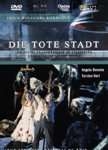|
Back
04/29/2011
Erich Wolfgang Korngold: Die tote Stadt, Op. 12
Angela Denoke (Marietta), Torsten Kerl (Paul), Yuri Batukov (Frank), Birgitta Svenden (Brigitta), Barbara Baier (Juliette), Julia Oesch (Lucienne), Christian Baumgärtel (Victorin), Stephan Genz (Fritz), The Strasbourg Orchestre philharmonique, Chorus of the Opéra national du Rhin, Ching-Lien Wu (Chorus Master), Jan Latham-Koenig (Conductor), Inga Levant (Stage Director), Charles Edward (Set & Costume Designer), Magali Gerberon (Costume Designer), François Duplat (Producer), Don Kent (Video Director)
Recorded live at Opéra national du Rhin, Strasbourg (2001) – 145’
ARTHAUS MUSIK Ref. #: NTSC 100343 –
Picture Format: 16:9 - Sound Format: DTS 5:1 PCM Stereo – Subtitles in German (sung language), French, Spanish, English, & Japanese – Booklet in English, German, & French

Erich Wolfgang Korngold was only twenty-three when Die tote Stadt (The Dead City) premiered in 1920. It was his fourth opera. The work remained popular in Europe for a few decades but never seems to have made it to standard repertoire, in spite of an ongoing revival with recent productions in Vienna, London, New York, San Francisco, Barcelona, Salzburg, and Strasbourg.
The libretto by Paul Schott (Erich W. Korngold’s father’s nom de plume) closely follows the novel Bruges la morte (albeit with a different ending) by George Rodenbach. It depicts the inner psychological drama of a man’s morbid obsession with his dead wife, how he meets another woman who physically resembles her closely, but with a quite different persona.
Arguably enough, Inga Levant’s production retells the story from Rodenbach’s point of view, with Paul slitting his wrists and collapsing against a door capped with a “NO EXIT” sign, contrary to the libretto’s ending where Paul is cured from his obsession and vows to start a new life. However, it is amazing to see how Korngold’s music fits a different outcome. The morbid, heavily Freudian staging, packed with numerous symbols (dolls, skeletons, and other psychedelic twaddle), and cinematic associations, are soon overlooked. Charles Edward’s surreal sets and costumes efficiently blend hallucination and reality, while the placeless and timeless setting make Paul’s plight quite universal.
This production benefits from an excellent cast. The two leading roles are notoriously demanding in terms of vocal range and heft. Both tenor Torsten Kerl (Paul) and Angela Denoke’s hefty soprano (Marietta) impressively serve their devilish parts. Dramatically, all cast members are highly convincing and do not suffer from the oddities of the staging. Stephan Genz as Fritz the Pierrot, Yuri Batukov as Frank, and Birgitta Svenden as Brigitta do commendable justice to their respective parts.
At the helm of the Strasbourg Orchestre philharmonique, conductor Jan Latham-Koenig gives a highly sensitive account of Korngold’s dense and sumptuous score. His subtle painting of the kaleidoscopic colors of the music never impedes the rhythmic clarity.
Listen to Marietta’s Lied by Angela Denoke
Christian Dalzon
|